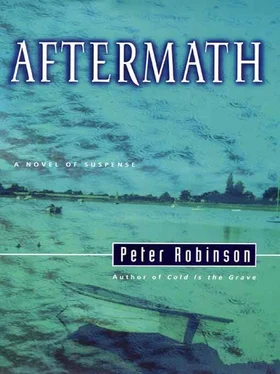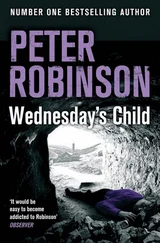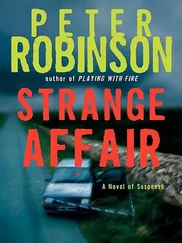“Could you elaborate on that?”
Maggie sipped some coffee. It was lukewarm. In Toronto, she remembered, they would come around and refill your cup once or twice. Not here. “I might have had reason to believe that Lucy Payne was in danger from her husband.”
“Did she tell you that?”
“Yes.”
“That her husband abused her?”
“Yes.”
“What do you think of Terence Payne?”
“Not much, really.”
“Do you like him?”
“Not particularly.” Not at all , Maggie admitted to herself. Terence Payne very much gave her the creeps. She didn’t know why, but she would cross the street if she saw him coming rather than meet, say hello and make small talk about the weather, all the time with him looking at her in that curiously empty, dispassionate manner he had, as if she were a butterfly pinned to a felt pad, or a frog on the table ready for dissection.
As far as she knew, though, she was the only one to feel that way. He was handsome and charming on the surface, and according to Lucy he was popular at school, both with the kids and with his colleagues on staff. But there was still something about him that put Maggie off, an emptiness at his center that she found disturbing. With most people, she felt that whatever it was she communicated, whatever radar or sonar beam went out, bounced off something and came back in some way, made some sort of blip on the screen. With Terry, it didn’t; it disappeared in the vast, sprawling darkness inside him, where it echoed forever unheard. That was the only way she could explain the way she felt about Terry Payne.
She admitted to herself that she might be imagining it, responding to some deep fear or inadequacy of her own – and God knew, there were enough of those – so she had resolved to try not to criticize him for Lucy’s sake, but it had been difficult.
“What did you do after Lucy told you this?”
“Talked to her, tried to persuade her to seek professional help.”
“Have you ever worked with abused women?”
“No, not really. I…”
“Were you a victim of abuse yourself?”
Maggie felt herself tightening up inside; her head started to spin. She reached for her cigarettes, offered one to Lorraine, who refused, then lit up. She had never talked about the details of her life with Bill – the pattern of violence and remorse, blows and presents – with anyone here except her psychiatrist and Lucy Payne. “I’m not here to talk about me,” she said. “I don’t want you to write about me. I’m here to talk about Lucy. I don’t know what happened in that house, but it’s my feeling that Lucy was as much a victim as anything else.”
Lorraine put her notebook aside and finished her coffee. “You’re Canadian, aren’t you?” she asked.
Surprised, Maggie answered that she was.
“Where from?”
“Toronto. Why?”
“Just curious, that’s all. I’ve got a cousin lives there. That house you’re living in. Tell me, but doesn’t it belong to Ruth Everett, the illustrator?”
“Yes, it does.”
“I thought so. I interviewed her there once. She seems like a nice person.”
“She’s been a good friend.”
“How did you meet, if you don’t mind my asking?”
“We met professionally, at a convention a few years ago.”
“So you’re an illustrator, too?”
“Yes. Children’s books, mostly.”
“Perhaps we can do a feature on you and your work?”
“I’m not very well known. Illustrators rarely are.”
“Even so. We’re always looking for local celebrities.”
Maggie felt herself blush. “Well, I’m hardly that.”
“I’ll talk with my features editor, anyway, if that’s okay with you?”
“I’d rather you didn’t, if that’s all right.”
“But-”
“Please! No. Okay?”
Lorraine held her hand up. “All right. I’ve never know anyone turn down a bit of free publicity before, but if you insist…” She put her notebook and pencil in her handbag. “I must be going now,” she said. “Thank you for talking to me.”
Maggie watched her leave, feeling oddly apprehensive. She looked at her watch. Time for a little walk around the pond before heading back to work.
“Well, you certainly know how to pamper a girl,” Tracy said as Banks led her into the McDonald’s at the corner of Briggate and Boar Lane later that afternoon.
Banks laughed. “I thought all kids loved McDonald’s.”
Tracy nudged him in the ribs. “Enough of the ‘kid,’ please,” she said. “I’m twenty now, you know.”
For one horrible moment Banks feared he might have forgotten her birthday. But no. It was back in February, before the task force, and he had sent a card, given her some money and taken her out to dinner at Brasserie 44. A very expensive dinner. “Not even a teenager anymore, then,” he said.
“That’s right.”
And it was true. Tracy was young woman now. An attractive one at that. It almost broke Banks’s heart to see how much she resembled Sandra twenty years ago: the same willowy figure, with the same dark eyebrows, high cheekbones, hair in a long blond pony-tail, stray tresses tucked behind her delicate ears. She even echoed some of Sandra’s mannerisms, such as biting her lower lip when she was concentrating and winding strands of hair around her fingers as she talked. She was dressed like a student today: blue jeans, white T-shirt with a rock band’s logo, denim jacket, carrying a backpack, and she moved with assurance and grace. A young woman, no doubt about it.
Banks had returned her phone call that morning, and they had arranged to meet for a late lunch, after her last lecture of the day. He had also told Christopher Wray that they hadn’t found his daughter’s body yet.
They stood in line. The place was full of office workers on afternoon break, truant school-kids and mothers with prams and toddlers taking a break from their shopping. “What do you want?” Banks asked. “My treat.”
“In that case, I’ll have the full Monty. Big Mac, large fries and large Coke.”
“Sure that’s all?”
“We’ll see about a sweet later.”
“It’ll bring you out in spots.”
“No, it won’t. I never come out in spots.”
It was true. Tracy had always had a flawless complexion; school friends had often hated her for it. “You’ll get fat, then.”
She patted her flat stomach and pulled a face at him. She had inherited his metabolism, which allowed him to live on beer and junk food and still remain lean.
They got their food and sat at a plastic table near the window. It was a warm afternoon. Women wore bright sleeveless summer dresses, and the men had their suit jackets slung over their shoulders and their shirtsleeves rolled up.
“How’s Damon?” Banks asked.
“We’ve decided not to see each other till after exams.”
There was something about Tracy’s tone that indicated there was more to it than that. Boyfriend trouble? With the monosyllabic Damon, who had spirited her off to Paris last November, when Banks himself should have been with her instead of hunting down Chief Constable Riddle’s wayward daughter? He didn’t want to make her talk about it; she would get to it in her own time, if she wanted to. He couldn’t make her talk, anyway; Tracy had always been a very private person and could be as stubborn as he was when it came to discussing her feelings. He bit into his Big Mac. Special sauce oozed down his chin. He wiped it off with a serviette. Tracy was already halfway through her burger, and the chips were disappearing quickly, too.
“I’m sorry I haven’t been in touch very often lately,” Banks said. “I’ve been very busy.”
“Story of my life,” said Tracy.
Читать дальше












